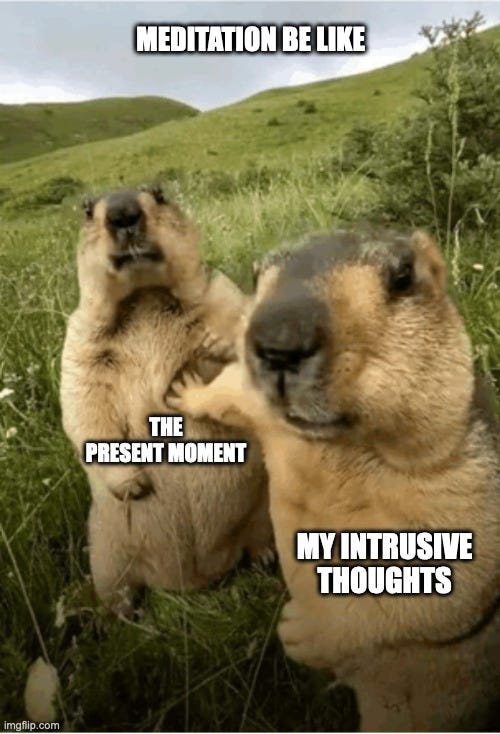be here now - why meditation feels like a cheat code for life
sharing my own bumpy meditation journey, advice on how to start and why you won't regret putting the work in
We all know mindfulness advocates can be annoying as hell with their constant missionising - I used to be so annoyed by them. But after six years of meditating, I have to do some preaching of my own: I can’t emphasise enough how much meditation has changed my life. It really feels like a cheat code.
I sometimes envision a utopian world in the not-so-distant future where meditation is commonly taught in school. The people in this world would be shocked at how little role mindfulness played back in the day. The way we talk about how backward societies were just centuries ago, recalling with bewilderment that people were allowed to smoke everywhere, on a plane, in a restaurant - literally everywhere. Ewww! Perhaps these future societies will look at our mindless habits the same way. Well, only if climate change doesn’t destroy the world first… but until then, let’s try to make our lives a little more worthwhile. And honestly, the best way to manifest less suffering into our existence is to start meditating.
“The quieter you become, the more you can hear.”
― Ram Dass
The simplest case for meditation is the sheer extent to which we’re consistently held back by our limiting beliefs and our negative self-talk. Likewise, consider how much could change if we could gain some sovereignty over our minds. Meditation really functions as an all-purpose tool for mental health. Being able to observe your thoughts is fundamental to dismantling them. I’d say, it’s the single most impactful healing practice I can think of - giving more agency over what I want to engage with and what I don’t. Hence, I want to share insights from my meditation journey, give advice on how to start, and hopefully inspire some of y’all to begin practising or to keep going when it gets tough.
my own bumpy meditation journey
My first go at meditation was a complete failure. It was seven years ago and I gave up after just a couple of weeks. I was one of those people who concluded after a few sessions: “meditation might be a nice thing, but it’s just not for me - I have too many thoughts”. The typical mistake of assuming meditation’s goal is to achieve this blissful state of clearing the mind entirely, sitting still without any thoughts at all. The type of enlightenment one rarely reaches. Ironically enough, at the time, I was already working on a science project investigating the effects of mindfulness on schizophrenia. We even published several papers and a book on this subject. So while I was fully aware of the practice’s effectiveness, I still struggled mightily to implement my own mindfulness routine.
the ability to let go of intrusive thoughts
Then I gave it another try about two years later. It was a rather desperate move after a series of distressing social events, where I noticed my obsessive tendencies and rumination causing suffering. There were times when I felt isolated and lonely, noticing a direct link to my obsessive and dissociative disposition. I feared pushing away my partner and worsening my loneliness even further. Much of this suffering stemmed from my inability to let go of my intrusive thoughts. I recently saw this meme that said: “anxiety is just conspiracy theories about your life” and it’s spot-on. My ego was framing my life events in harmful ways, often to the detriment of the people I love - like telling me my partner was evil and I should protect myself from her. Part of me knew it wasn’t true, but I lacked the skills to detach myself from this loud narration. Often it seemed impossible to let go and it left me feeling defeated and powerless.
Hence, I knew it was time to actually change something in my life and integrate this practice that all these clever people rave about. My goal was to become more present in general, but especially in social settings, feeling less disconnected. I was also aiming to gain more agency, to feel less like a victim of my obsessiveness. Again, the beginning was rough. I had to apply a lot of discipline.
no instant gratification
Meditation isn’t like exercising, where you receive instant gratification and feel a noticeable effect right away. In the early stages, it may even feel useless. You won't meditate for 10 minutes and turn into a different person immediately. But if you stick to it, it will change your life.
The claim “it’s just not for me, I have too many thoughts” turned out to be false as well. Meditation is helpful for almost everyone, but for heavy thinkers, it’s even more suitable and impactful. It’s like being especially talented in a sport or an instrument.
the effort finally paying dividends
Nowadays, it's so much easier for me to let go of thoughts, noticing when I’m being carried away from the present moment or when I’m creating a harmful narrative in my head that would lead to suffering if I continued to engage with it. I vividly remember a key experience after a couple of months of practising, when I was pissed at my partner for something she did. While I may have had the right to be mad at her, I also had this tendency to create guilt-tripping plots in my head - like a state attorney nitpicking every compromising detail from the past to build a convincing case against the defendant (it’s giving Anatomy of a Fall).
It was my ego trying to protect me from getting hurt, but most of the time it was hella exaggerated and gave my partner a hard time. In this instance tho, I was able to notice a harmful narrative arising in my head and I had this split second of pausing and asking myself: “do I really want to engage with these thoughts, knowing all too well where they will lead me?”
I envisioned how much more resentful I would feel in a couple of minutes if I continued with this state attorney behaviour. So I decided: “I want to go a different route. I don’t want to feel like a victim, I don’t want to feel hatred”.
I was able to let go of the harmful narrative while still addressing the violation of my boundaries, but in a calm and non-violent way. It felt sooo empowering to experience this agency and motivated me to keep going with my meditation practice - the effort finally paying dividends.
getting started - no days off
If you, like most people, struggle with finding consistency in your practice, my advice is to make it a priority in your life and to do it every day. Like a gym bro would say: no days off lol. I’ve labeled meditation the most important thing to do after waking up. Otherwise, there would always be something seemingly more pressing, and I’d end up skipping it.
In the past, I would meditate occasionally, but often after rising, I would have all these other to-do's that appeared more urgent. Labelling it the most important thing to do has the side effect, that I always feel like I’ve accomplished something significant each morning, and everything else that day becomes a bonus achievement.
I began with the Calm app, which made it easy to just do it without browsing for the right meditation video or setting a timer. Simply opening the app and doing 10 mins of meditation each morning. The app’s meditation streak feature provides extra motivation to keep one’s streak going, especially on days when you feel lazy or not in the mood to meditate. Further, I found it helpful to get one of these meditation cushions called Zafu, it’s much more comfy to meditate on them and it’s also cute to create a little ritual of sitting on the cushion and perhaps lighting some incense. Nowadays just seeing the Zafu in my room serves as a reminder to meditate.
“The primary cause of unhappiness is never the situation but your thoughts about it.”
― Eckhart Tolle, A New Earth: Awakening to Your Life's Purpose
~ recommended resources ~
Ten Percent Happier Podcast: Host Dan Harris shares so much wisdom in his delightful podcast. In each episode, he invites a guest to tackle mindfulness from various angles, and I’ve learned so much from them. Harris describes himself as a fidgety, skeptical journalist who reluctantly tried meditation - and it changed his life. I’ve rarely witnessed anyone as skilled at interviewing people and paraphrasing their messages in a brilliant way. What I particularly appreciate about his work is how he combines wisdom with humour. Some spiritual people forget how to laugh about life, they may get overly serious on their path to enlightenment. Not with Harris though, he regularly cracks me up. Moreover, his approach is practical: happiness is a skill you can train like a muscle. Dan Harris has also written a couple of amazing books, detailing his meditation journey in an approachable way. It was a highly inspiring read and I’ve already gifted his book to my brother and three skeptical friends (preachers gon’ preach)
There are tons of great meditation videos and teachers out here, but John Davisi’s guided meditations really resonate with me, you can find him on YouTube or Spotify. Unlike some guided meditations where you just want the narrator to stop talking so you can focus on your breath, Davisi has a special talent for providing guidance without being annoying.
Everyone recommends that after practising for some time it is key to find a meditation teacher. Joining a local, in-person meditation group can be an excellent way to build a mindful community. It might not always be easy to find such a group, especially if you don’t live in a large city, but I’ve found it helpful to at least do some research and otherwise look for a meditation centre for a silent retreat.







